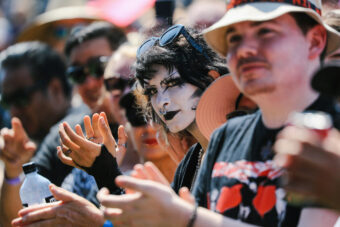And now, on the heels of Miley Cyrus’ harrowing MTV Video Music Awards performance, comes “Twerk,” her new single with Justin Bieber and Lil Twist, a Lil Wayne underling and non-entity. Here, Cyrus approximates a ‘tude culled from swaggering female rap (“I came up in this party, time to twerk!”) while Bieber sings club-dude platitudes, but it’s more a sketch of a song than a fully formed track. “Twerk” does little more than attempt to replace the more generic pop nods to “tha’ club” heard in most dance songs; it exists just so Cyrus can further take control of the word “twerk” itself.
See, 2013 is the year where pop got very good at Google bombing: Baauer’s “Harlem Shake” buries the original Harlem Shake dance; Justin Timberlake, the remaining man of the monoculture, calls his single “Take Back the Night,” despite that already being the name of a very important international march in protest of rape and sexual violence; and now, Miley has glommed herself onto twerking, a style of dance with a knotty history and its roots in New Orleans’ queer-friendly bounce music culture. Almost always, the result of these pop songs piggy-backing onto some other subculture or movement is that it shoves the original, authentic article out of the picture entirely. It’s a new, nefarious twist on appropriation: The success of the appropriators buries the original, even in Google searches. It’s not so easy now to “do your research” and trace the roots of a pop-culture phenomenon.
Miley herself, though, is becoming a hip-hop pawn. Kanye West announced this week that there will be a “Black Skinhead” remix featuring Cyrus, which lines up with West’s more recent misreadings as to what qualifies as provocative or profound. Dropping the egregious appropriator of the moment onto “Black Skinhead,” a racially charged song (and one that, for a moment there, was celebrated for its candor in the face of far less outspoken rap) is just unwise. Perhaps it stems from the same contrarian impulse that got 50 Cent on a Talib Kweli remix, or paired Mos Def with Freeway, but it seems less like a challenge and more like a grab for attention. Then again, Kanye was recently seen at the offices of Buzzfeed, right? Hip-hop itself is becoming clickbait.
The Atlantic‘s Noah Berlatsky suggested that really, this is an issue of “talent,” and that because Miley Cyrus stinks, her actions are criticized or dismissed as racially problematic more easily. Strangely, he offers up Janis Joplin, another appropriator, as an analogue. Cyrus doesn’t lack talent, though. Her voice is pretty good, and she occupies Mike Will Made It’s syrup-drinking, slow-to-strip-club-fast beat expertly. So while Miley probably couldn’t do what Janis did, Janis couldn’t do what Miley does, either. It’s a provocative argument that kind of falls apart if you think about it for more than a few seconds. Not to mention, Berlatsky grossly misunderstands the specifics of Cyrus’ performance and why it really is a rarefied case that deserves special attention. This isn’t singing “black” or performing “black”; this is Cyrus surrounding herself with blackness in the form of anonymous dancers and then objectifying him. We can cringe seeing white performers backed by black bands, but there is some sense of agency there. There isn’t even a little bit of give-and-take between white and black performer in Cyrus’ VMA’s flame-out.

Also Read
GEAR THAT MADE THE GAME: Rap Machinery
Yesterday, I tried to counter the narrative that Cyrus’ raunchy performance is even stranger because she is the child of the wholesome country singer Billy Ray Cyrus: Multiple lazy write-ups mention this, ignoring the reality that Billy Ray’s success, in part, hinged on his sex appeal and willingness to objectify himself. He was supposed to appear on Piers Morgan’s CNN show this week, but wisely bailed out at the last moment. The only comment we’ve got on the current father-daughter dynamic comes via Miley’s Twitter, which quoted her dad: “Miley, if twerkin woulda been invented…. And I had a foam finger…. I woulda done the same thang you did.” That’s actually pretty admirable and bad-ass, and highlights where Miley’s savvy comes from.
Meanwhile, the New York Times‘ Jon Caramanica paints Miley’s VMA’s performance as a counter to what he dubbed the “Summer of Smooth”: Justin Timberlake’s “Suit and Tie,” Daft Punk’s “Get Lucky,” Robin Thicke’s “Blurred Lines,” Bruno Mars’ “Treasure,” and Drake’s “Hold On, We’re Going Home.” He affords the song “We Can’t Stop” a little too much credit, saying it has a “hint of smooth to it,” but “a seismic rumble at its foundation.” But “We Can’t Stop” and “Blurred Lines” are part of the same campaign: crowd a canny, crowd-pleasing hit with sex and thinkpiece bait to extend its life for a little while. That’s why the two artists quite physically slammed into one another at the VMA’s: The male (and far better media-trained) Thicke has just been able to talk his way out of his song’s sexism (or parody of sexism), while Cyrus, young and female (and a brash idiot), is fanning the flames of her success by running wild. The industry has much more to gain when Miley puts her foot in her mouth, at least until it casts her callously aside.




